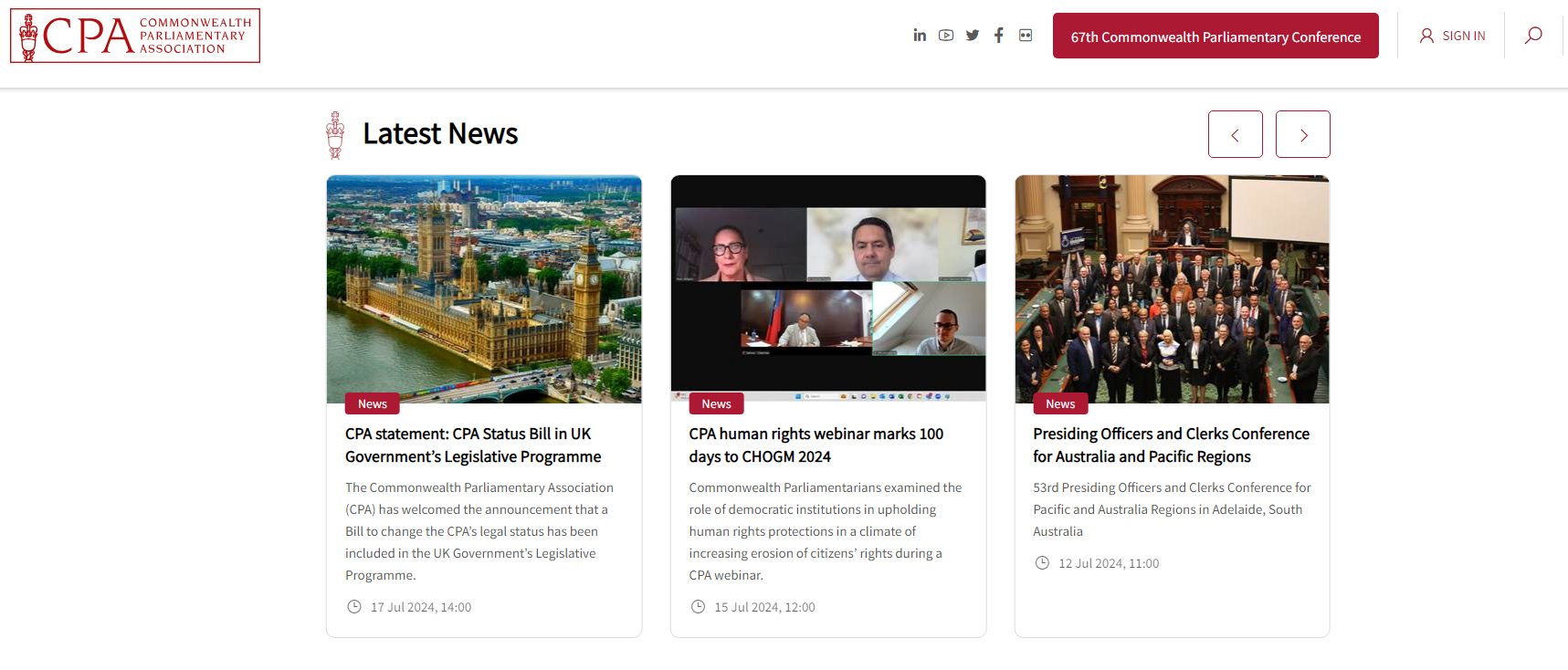 The website of the Commonwealth Parliamentary Association
The website of the Commonwealth Parliamentary Association
[This article is from The Round Table: The Commonwealth Journal of International Affairs.]
The Commonwealth Parliamentary Association, the venerable body to which all Commonwealth parliaments belong, anticipates a change in status. The UK Parliament has before it a Bill to make it a truly international institution in law, like the London-based International Maritime Organisation, part of the UN family.
It must now step up, to coordinate civil society participation in the processes by which countries join, or rejoin the Commonwealth. For what has been defined since the Eminent Persons Group reported in 2011, and in the Commonwealth Charter adopted two years later, is that the Commonwealth is not just a club of governments. It is an association of the peoples of the member states. And there is a lacuna here.
Back in the 1990s I organised a service over three years, after South Africa rejoined and Mozambique joined, to link civil society bodies there with potential partners in the Commonwealth family. Called the Commonwealth Non-Governmental Office for South Africa and Mozambique, CONGOSAM, it linked some 20 Commonwealth NGOs and ran workshops and conferences in those countries. The aim was to build practical links, and embed Commonwealth awareness.
But this initiative followed rather than preceded Commonwealth membership. What is needed now is an assessment in advance of a public’s appetite for the Commonwealth, and a country’s existing alignment with requirements stated after the 2007 Kampala summit – such as democracy and fair elections, rule of law and an independent judiciary, and human rights (including, especially, freedom of expression). Is an application for membership from a handful of Ministers and officials wanting another international tie, with marginally improved respectability, without reference to their people? How many citizens have even heard of the Commonwealth?
At present, the processes by which states join are opaque and mysterious, managed by the Commonwealth Secretary-General, and lack the overt leverage in the direction of benchmarked achievements, used by the European Union and its Commission when handling similar applications. The embarrassment that can result has been demonstrated by the debacle after Gabon and Togo were admitted without prior informed discussion in 2022.
Why have Gabon and Togo joined the Commonwealth?
Palestine and the modern Commonwealth: Past engagements and future membership?
Gabon, a central African Francophone state to the south of Cameroon, saw an army coup only a year later, which overthrew Ali Bongo, a dynastic dictator. The army regime is now sanctioned by the Commonwealth Ministerial Action Group and excluded from Commonwealth councils. Information that has emerged since makes it clear that the Commonwealth Secretariat, and the Heads who rubber-stamped admission in Kigali, had utterly failed in due diligence. A more open and public process, led by respected non-government figures, could have forestalled this disaster.
The situation for the Commonwealth is not much happier in Togo, a small Francophone West African state adjoining Ghana. Unlike Gabon, Togo had applied for membership some years ago, but this was put on hold after bloody street riots in the country. Togo has been ruled for 57 years by the Gnassingbé dynasty. In April, this year President Faure Gnassingbé carried out what his political opponents have called a ‘constitutional coup’ just prior to a general election. Now aided by 108 MPs of his UNIR party in an assembly of 113 he has deftly switched from being President to being a Prime Minister, without any restriction on his terms. The election was observed by the Community of Sahel-Saharan States, the African Union, the Francophonie, and ECOWAS. The Commonwealth was absent.
The 2007 rules for membership encourage newly joined states to join the Commonwealth Foundation, along with their domestic support for civil society. But as a government-funded body it might have more difficulty than the international Commonwealth Parliamentary Association in taking a lead in a civil society assessment of applications. The CPA should certainly consult the Foundation, which has done so much to promote awareness of the Commonwealth Charter, in considering how to take on a coordinating role here. It should also liaise with the Commonwealth Lawyers’ Association and the Commonwealth Human Rights Initiative – representing the two other pillars of the sadly missed Commissioner for Democracy, Rule of Law and Human Rights, shot down by Heads of Government at Perth in 2011.
The CPA will need to have a budget for assessments, choose respected non-governmental figures to conduct visits and interviews, and publish its findings in time for decision by leaders at a Commonwealth summit. Current practices do not live up to Commonwealth aspirations and tarnish a little-known and often misunderstood brand.
The international CPA, widely seen as a parliamentary back-benchers’ club, has its own internal issues and not all the member parliaments or all its thousands of MPs are squeaky clean. But thanks to two respected British Parliamentarians, Dame Maria Miller MP and Baroness D’Souza, it hopes to get the status its valuable service deserves. Yet with greater honour and respect comes greater responsibility. For a government to join the Commonwealth is a privilege the CPA can help protect.
Richard Bourne is an emeritus member of the Round Table editorial board.



